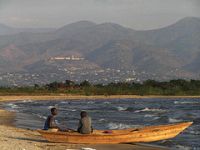Visit worldtravels.com for the full guide to Burundi. Build a complete Burundi travel guide and email to your clients - sign up for a trial subscription of World Travels Pro.
Burundi

Overlooking the turquoise waters of Lake Tanganyika with a freshly roasted cup of coffee, banana frites and some succulent brochettes, the serenity and charm of Burundi will dawn on visitors like a pleasant surprise. Emerging from a longstanding civil war, travel to Burundi has been discouraged up until recently and the small republic in east Africa, sandwiched between African titans Tanzania and the Democratic Republic of Congo, is now enjoying an influx of curious tourists, attracted by its new-found peace and astounding natural beauty.
Lapped by the clear waters of grand dame Lake Tanganyika, the longest lake in the world, and blessed with lush mountainous jungles to the north and rolling green hills to the east, the only land below 3,000 feet (915m) in Burundi, is a narrow strip of plain along the Ruzizi River. A wealth of sights are on offer, from the thermal waterfalls in the Mugara Reserve and the southern source of the Nile at Rutovu, to Kibira National Park, where chimpanzees, colobus monkeys and crested mangabeys dash swiftly through dense foliage. And even though coffee is the country's largest export, it is the vast tea plantations of Teza and Rwegura that will capture the visitor's imagination.
Burundi has had a turbulent history. A 12-year ethnic-based civil war between the Hutus and Tutsis, mirroring the violent genocide in neighbouring Rwanda, broke out in the early 1990s after tension between the dominant Tutsi minority and Hutu majority flared up, demoralising the people and weakening the country's infrastructure. A ceasefire agreement and free and fair elections were conducted in 2005, resulting in relative peace and a new democratic government.
Although undeveloped and in bad repair, the capital Bujumbura, offers a friendly and cosmopolitan ambience. Charming art deco buildings from the colonial heydays line the streets and restaurants serving Belgian, Asian and Burundi cuisine, as well as the local Primus beer, can be found throughout the centre. For colourful markets, leather, ceramics, ivory and woodcarvings, follow the road to Gitega, Burundi's second largest city, where the Museum of Traditions can also be found.
Climate
Burundi enjoys a warm equatorial climate. Temperatures vary with altitude and season. Summers are hot and humid and winters only slightly cooler. Rainfall is irregular, falling mainly in the northwest with rainstorms common at higher altitudes .The rainy season occurs from March to May and September to December. Dry seasons vary in length but are usually from June to August and January to March.
Money
The official currency is the Burundian franc (BIF), which is divided into 100 centimes. Since Burundi started issuing its own currency, centimes have not been produced. Currency exchange can be conducted at a main bank in Bujumbura or Gitega. US dollars, dating before 2003, are often not accepted. Travellers cheques in US dollars or Euros are accepted but commission rates are high. Banks are open from Monday to Friday in the morning only. Credit cards are rarely accepted and ATMs are not readily available, so it is wise to bring the necessary capital in an easily exchangeable currency.
Passport Visa
A visa will be issued on arrival if there is no Burundi diplomatic representation in the traveller's country of origin. Diplomatic representation is currently available in Belgium, Canada, China, France, Germany, Japan and the USA. Tourist or business visas, valid for up to 30 days, incur a fee of EUR50. Return or onward tickets, all documents required for next destination and sufficient proof of funds are recommended.
Entry Requirements
- US nationals require a valid passport and visa.
- UK nationals require a valid passport and visa.
- Canadians require a valid passport and visa.
- Australians require a valid passport and visa.
- South Africans require a valid passport and visa.
- Irish nationals require a valid passport and visa.
- New Zealand nationals require a valid passport and visa.
Health
There have been cases of cholera confirmed in Burundi. Chloroquine and sulfadoxine-pyrimethamine resistant malaria is a major concern in Burundi and travellers should take the necessary prophylactics containing lariam, malarone or doxycycline. A yellow fever vaccination certificate is required if coming from an infected area or visiting any area outside of the main cities. Travellers should be wary of kiosk foods and drink only bottled or boiled water. Burundi's medical facilities are very basic. Travellers should ensure they have health insurance covering evacuation by air ambulance.
Embassy Consulates
- Burundi Embassy, Washington DC, United States: +1 202 342 2574.
- Burundi Embassy, Ottawa, Canada: +1 613 789 0414/789 7042.
- Burundi Embassy, Pretoria, South Africa: +27 (0)12 342 4881/4883.
Foreign Embassies
- United States Embassy, Bujumbura: +257 22 20 7000
- British Embassy Liaison Office, Bujumbura: +257 22 246 478.
- Canadian High Commission, Nairobi, Kenya (also responsible for Burundi): +254 20 366 3000.
- Australian High Commission, Nairobi, Kenya (also responsible for Burundi): +254 20 444 5034-9.
- South African Embassy, Bujumbura: + 257 2224 8220
- Embassy of Ireland, Dar-es-Salaam, Tanzania (also responsible for Burundi): +255 22 2602 355.







